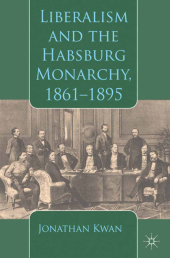 Neuerscheinungen 2013Stand: 2020-01-07 |
Schnellsuche
ISBN/Stichwort/Autor
|
Herderstraße 10
10625 Berlin
Tel.: 030 315 714 16
Fax 030 315 714 14
info@buchspektrum.de |

J. Kwan
Liberalism and the Habsburg Monarchy, 1861-1895
1st ed. 2013. 2013. x, 308 S. 235 mm
Verlag/Jahr: SPRINGER PALGRAVE MACMILLAN; PALGRAVE MACMILLAN UK 2013
ISBN: 1-349-47433-9 (1349474339)
Neue ISBN: 978-1-349-47433-2 (9781349474332)
Preis und Lieferzeit: Bitte klicken
Often the liberal movement has been viewed through the lens of its later German nationalism. This presents only one facet of a wide-ranging, all-encompassing project to regenerate the Habsburg Monarchy. By analysing its various nuances, this volume provides a new, more positive interpretation of Austro-German liberalism.
1. Introduction: Liberalism, Nationalism and the Austrian State PART I: THE ERA OF THE CONSTITUTIONAL PARTY, 1861-79 2. Articulating the Austro-German Liberal Vision, 1861-65 3. Fighting for the Constitution: Dualism and the Austro-German Liberals, 1865-67 4. Realising the Liberal Project: Liberal Hubris and Insecurity, 1867-79 PART II: THE PARADIGM CHANGE: THE LIBERALS IN OPPOSITION, 1879-85 5. Defending Parliamentary Privilege: Foreign Policy, Liberal Opposition and the Responsibility of State Power 6. A Possible Czech-German Liberal Alliance: The Emmersdorf Discussions, 1878-79 7. ´The End of the Constitutional Party´? New Directions and the New Politics, 1879-85 PART III: DEFENDING DEUTSCHTUM: LIBERALISM AND THE RISE OF NATIONALIST POLITICS 8. Anti-Semitism and Austro-German Liberalism, 1861-95 9. Bohemia, Austria and Radical Politics: A Case Study, 1879-93 10. Ernst von Plener and the Final Liberal Coalition Government, 1893-95 11. Conclusion: Austro-German Liberalism at the Turn-of-the-Century
Jonathan Kwan is Lecturer in Modern History at the University of Nottingham, UK. He has studied at the Universities of Queensland, London and Oxford. Publications include articles on the 1867 Compromise, the Transylvanian Saxon community and other topics associated with the Habsburg Monarchy and Central Europe in the nineteenth century.


